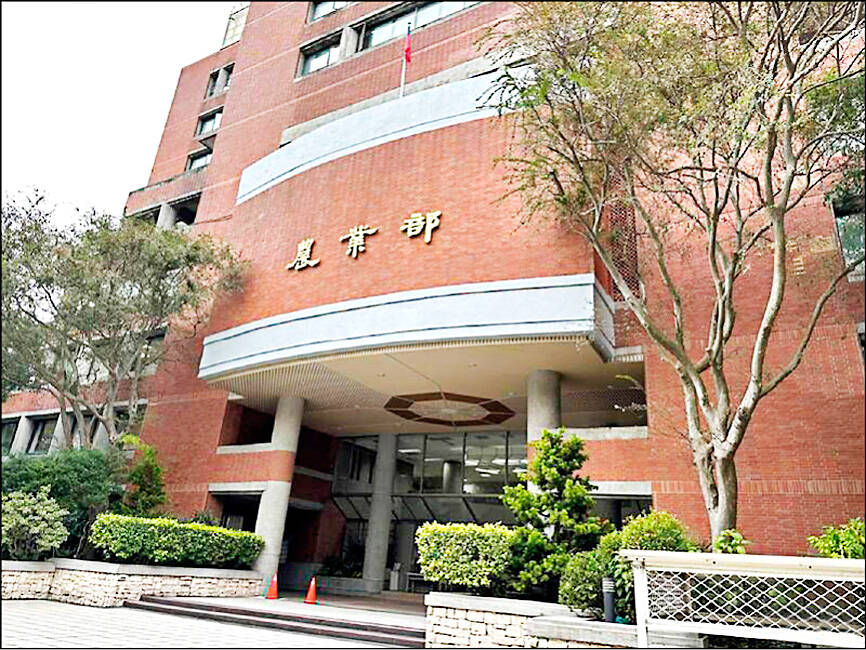The Ministry of Agriculture on Monday unveiled a comprehensive support package to help agricultural producers and exporters weather the impact of impending US tariffs.
The six-point initiative was introduced in response to a decision by US President Donald Trump’s administration on April 2 to impose a 32 percent import tariff on all goods from Taiwan, a measure that was postponed for 90 days one week later.
In its place, the US has enacted a temporary 10 percent tariff on most imports from countries worldwide, including Taiwan, with China one of the few exceptions

Photo: Taipei Times
The measures are designed to stabilize the industry, protect affected producers and enhance Taiwan’s competitiveness in domestic and overseas markets, the ministry said.
To help offset the short-term financial impact of the tariffs, the ministry said it would subsidize loan interest rates by up to 0.75 percent for six months, adding that eligible farmers, agricultural groups and agribusinesses can apply for individual loans of up to NT$20 million (US$615,422).
Eligibility would also extend to producers with a history of exports to the US, as well as those indirectly affected by the tariff adjustments, the ministry said.
In addition to financial support, the government would offer subsidies to strengthen cold chain infrastructure, product processing and quality certification as part of broader efforts to upgrade production capabilities.
Flower growers meeting specific criteria would be eligible for subsidies of up to NT$10 million, while tea and edamame — a kind of immature soybean popular in East Asian cuisine — producers can apply for targeted support for equipment and packaging upgrades.
The ministry also announced support for branding, packaging innovation and market segmentation, including subsidies of up to NT$150,000 per project to help cover international certification costs for flower, edamame and tea products.
Aquaculture operators, including fish farmers raising barramundi and tilapia, would receive expanded support for cold storage and ice-making facilities, with subsidy rates increased by 10 percent compared with previous plans.
Deep-sea and offshore fishers catching mahi-mahi, particularly those participating in the Fishery Improvement Program, would be eligible for cold chain system upgrades of up to NT$3 million per vessel.
To help ensure continued access to global markets, the ministry would also fund overseas marketing campaigns for Taiwan-grown products, including flowers and seedlings, barramundi, tilapia, mahi-mahi and edamame, as well as fully domestically produced tea.
Detailed application guidelines are available on the ministry’s Web site, and a free consultation hotline has been set up to assist with inquiries.

The manufacture of the remaining 28 M1A2T Abrams tanks Taiwan purchased from the US has recently been completed, and they are expected to be delivered within the next one to two months, a source said yesterday. The Ministry of National Defense is arranging cargo ships to transport the tanks to Taiwan as soon as possible, said the source, who is familiar with the matter. The estimated arrival time ranges from late this month to early next month, the source said. The 28 Abrams tanks make up the third and final batch of a total of 108 tanks, valued at about NT$40.5 billion

Two Taiwanese prosecutors were questioned by Chinese security personnel at their hotel during a trip to China’s Henan Province this month, the Mainland Affairs Council (MAC) said yesterday. The officers had personal information on the prosecutors, including “when they were assigned to their posts, their work locations and job titles,” MAC Deputy Minister and spokesman Liang Wen-chieh (梁文傑) said. On top of asking about their agencies and positions, the officers also questioned the prosecutors about the Cross-Strait Joint Crime-Fighting and Judicial Mutual Assistance Agreement, a pact that serves as the framework for Taiwan-China cooperation on combating crime and providing judicial assistance, Liang

A group from the Taiwanese Designers in Australia association yesterday represented Taiwan at the Midsumma Pride March in Melbourne. The march, held in the St. Kilda suburb, is the city’s largest LGBTQIA+ parade and the flagship event of the annual Midsumma Festival. It attracted more than 45,000 spectators who supported the 400 groups and 10,000 marchers that participated this year, the association said. Taiwanese Designers said they organized a team to march for Taiwan this year, joining politicians, government agencies, professionals and community organizations in showing support for LGBTQIA+ people and diverse communities. As the first country in Asia to legalize same-sex

MOTIVES QUESTIONED The PLA considers Xi’s policies toward Taiwan to be driven by personal considerations rather than military assessment, the Epoch Times reports Chinese President Xi Jinping’s (習近平) latest purge of the Chinese People’s Liberation Army (PLA) leadership might have been prompted by the military’s opposition to plans of invading Taiwan, the Epoch Times said. The Chinese military opposes waging war against Taiwan by a large consensus, putting it at odds with Xi’s vision, the Falun Gong-affiliated daily said in a report on Thursday, citing anonymous sources with insight into the PLA’s inner workings. The opposition is not the opinion of a few generals, but a widely shared view among the PLA cadre, the Epoch Times cited them as saying. “Chinese forces know full well that